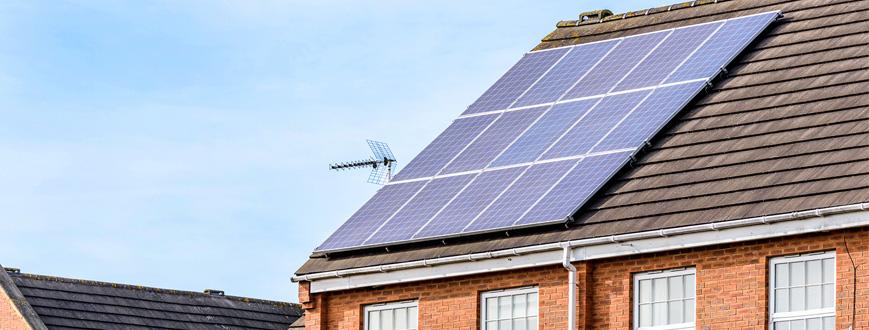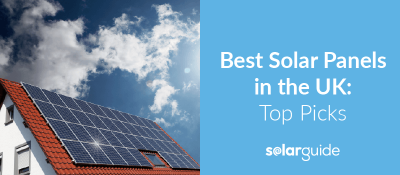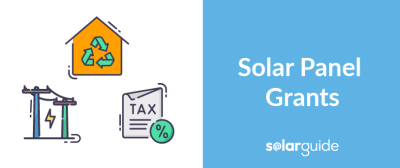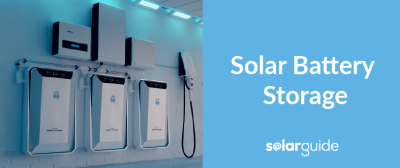Buying a House with Solar Panels

Finding that the property you're interested in has solar panels could be a great way to reap all the rewards of solar energy without having to concern yourself with the solar panel installation costs.
Before you start getting too carried away with the benefits, it's important to get as much information as possible about the solar system before putting down an offer. In this article, we've listed some of the questions you should ask when looking to buy a property with solar panels.
Get Free Solar Panel Quotes: Get quotes and compare prices.
What's the Size of the Solar System?
The size of the solar system on the roof will determine how much electricity it's capable of generating as well as how much you could be set to receive through the Feed-in Tariff (FiT).
When Were the Solar Panels Installed?
This is an important question to ask if you stand to inherit the Feed-in Tariff payments from the current owner. The FiT began back in April 2010, rewarding those installed a solar system with quarterly payments; however, these payments have been re-evaluated several times over the years, usually decreasing. That's one reason why it's important to know when the solar panels were installed.
It's important to note that the Feed-in Tariff closed to new solar PV installations on 31 March 2019 so if the solar panels are newly installed and the current homeowners haven't signed up to the scheme, you won’t be eligible for the scheme.
Not only is this an important question to ask in terms of FiT payments but finding out how old the panels are. Solar PV panels have a lifetime of around 25-30 years, at which point they'll either need replacing or removing altogether. Either of these will incur costs that you'll have to consider when the time comes which is why it's important to know how many years you'll be able to benefit from them for.
Who Installed the Solar Panels?
To be eligible for the Feed-in Tariff, the solar panels need to have been installed by a MCS certified (or equivalent) installer using.
The vast majority of solar installers across the UK will be MCS certified (or equivalent) approved but not all of them; the current owner should have a certificate that they can provide you with as proof.
Were the Solar Panels Installed as Part of a Rent-A-Roof Scheme?
One instance where you wouldn't receive FiT payments is if the homeowner installed their solar panels as part of a rent-a-roof scheme. This involves a third party paying for the solar panels to be installed on the roof, which will generate energy for the home, however all FiT payments will be signed over to the person who owns the solar panels, not the homeowner.
This means that the party who is 'renting' the roof will be doing so for 20-25 years, minus the amount of time they've already been doing so. You'll be using the solar power in your home which should lower your energy bills, but you also need to consider that cautious that you might be responsible for any future maintenance or repair costs, which could put off your mortgage lender.
Also, if you were to consider a loft conversion or extension that would disturb the solar panels, then you may have to went until the rent-a-roof lease has come to an end.
Does the System have a Solar Battery?
More often than not, the solar panels will be generating more energy than is being used around the house. Without a solar battery, this excess energy will be sent to the National Grid. However, having a solar battery means all of that spare energy can be stored so that it's ready to use when the solar panels aren't generating energy – like in the evenings.
Should you move into the house with panels but no solar battery, then they're well worth considering to help you further reduce those energy bills.
Get Free Solar Panel Quotes: Get quotes and compare prices.
Documents
A vital part of buying a home with solar panels is seeing the relevant documentation, you should ask for the following:
- Building Regulation Approval
- Structural roof survey
- Completion certificate
- Certificate confirming the installer is MCS certified (or equivalent)
- Electrical installation certificate
- Planning permission (if applicable)
- Solar panel warranty
So, is Buying a House With Solar Panels a Good Idea?
If your new home has solar panels on the roof then you could be set to benefit from reduced energy bills for as long as you live there. However, should the previous owner have signed up to a rent-a-roof scheme or not have had the installation carried out by an MCS certified (or equivalent) installer then you should err on the side of caution – we'd advise getting some legal advice.
Feed-in Tariff Payments Over Time
The FiT payments have changed over time but Ofgem have made it possible to look back at the rates being offered right back to the start of the scheme – as shown in the table below. It’s worth noting the the payments may have increased depending on the annual rate of Retail Price Index (RPI).
The owner of the property you’re interested in buying should be able to provide details of the payments they’re receiving through the scheme and how much time is left on the contract.
| FiT Payment Dates | Payment Rate at Time of Joining FiT (New Build Solar PV System) |
| 1 April 2010 – 31 March 2011 | 46p/kWh |
| 1 April 2011 – 31 July 2011 | 46p/kWh |
| 1 August 2011 – 29 September 2011 | 46p/kWh |
| 30 September 2011 – 2 March 2012 | 46p/kWh |
| 3 March 2012 – 31 March 2012 | 24.39p/kWh |
| 1 April 2012 – 31 July 2012 | 24.39p/kWh |
| 1 August 2012 – 31 October 2012 | 18.60p/kWh |
| 1 November 2012 – 30 November 2012 | 17.40p/kWh |
| 1 December 2012 – 14 March 2013 | 17.40p/kWh |
| 15 March 2013 – 31 March 2013 | 17.40p/kWh |
| 1 April 2013 – 30 April – 2013 | 17.40p/kWh |
| 1 May 2013 – 30 June 2013 | 17.40p/kWh |
| 1 July 2013 – 30 September 2013 | 16.78p/kWh |
| 1 October 2013 – 31 December 2013 | 16.78p/kWh |
| 1 January 2014 – 31 March 2014 | 16.35p/kWh |
| 1 April 2014 – 30 June 2014 | 15.78p/kWh |
| 1 July 2014 – 30 September 2014 | 15.78p/kWh |
| 1 October 2014 – 31 December 2014 | 15.78p/kWh |
| 1 January 2015 – 31 March 2015 | 14.99p/kWh |
| 1 April 2015 – 30 June 2015 | 14.46p/kWh |
| 1 July 2015 – 30 September 2015 | 13.96p/kWh |
| 1 October 2015 – 31 December 2015 | 13.47p/kWh |
| 1 January 2016 – 7 February 2016 | 12.84p/kWh |
| 8 February 2016 – 31 March 2016 | 4.68p/kWh |
| 1 April 2016 – 30 June 2016 | 4.61p/kWh |
| 1 July 2016 – 30 September 2016 | 4.53p/kWh |
| 1 October 2016 – 31 December 2016 | 4.46p/kWh |
| 1 January 2017 – 31 March 2017 | 4.28p/kWh |
| 1 April 2017 – 30 June 2017 | 4.31p/kWh |
| 1 July 2017 – 30 September 2017 | 4.24p/kWh |
| 1 October 2017 – 31 December 2017 | 4.16p/kWh |
| 1 January 2018 – 31 March 2018 | 3.93p/kWh |
| 1 April 2018 – 30 June 2018 | 4.01p/kWh |
| 1 July 2018 – 30 September 2018 | 3.93p/kWh |
| 1 October 2018 – 31 December 2018 | 3.86p/kWh |
Source: Ofgem Feed-in Tariff rates
As you can see, there's a downwards trend in the amount you could earn through FiT payments as the scheme aged.
Get Free Solar Panel Quotes: Get quotes and compare prices.
Find local, MSC certified Solar Installers
Start your quote
Find local, MSC certified Solar Installers














